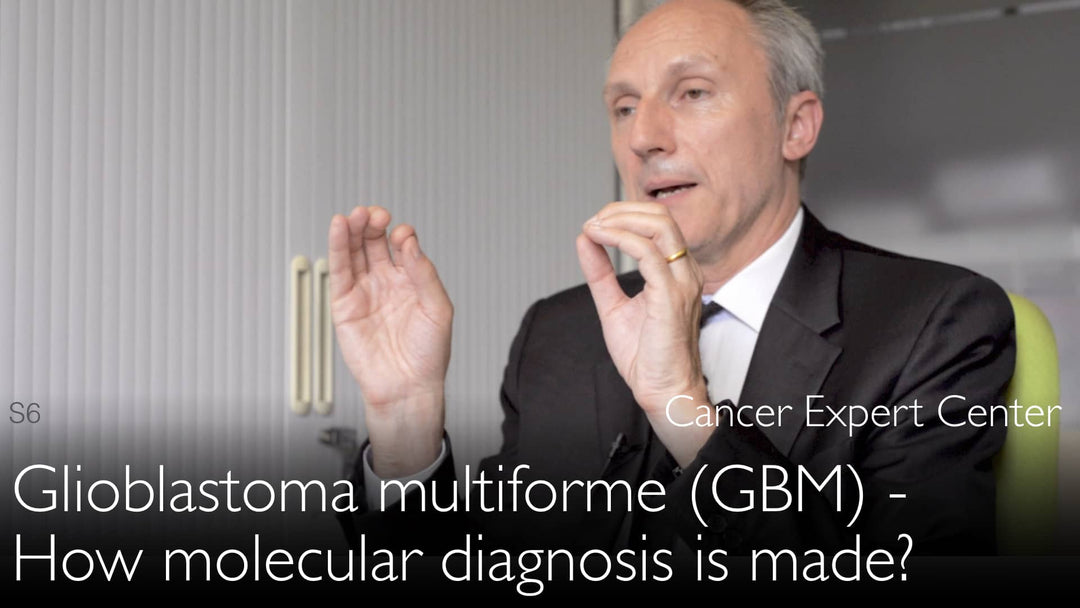Leading neuropathology expert Dr. Sebastian Brandner, MD, explains how molecular testing for MGMT promoter methylation improves glioblastoma multiforme (GBM) diagnosis and treatment. The epigenetic test predicts response to temozolomide chemotherapy by identifying tumors unable to repair DNA damage, offering patients more precise prognosis estimates and guiding clinical decisions.
MGMT Methylation Testing in Glioblastoma: How Molecular Diagnostics Guide Treatment
Jump To Section
- GBM: The Most Aggressive Brain Cancer in Adults
- MGMT Promoter Methylation Explained
- How DNA Repair Enzyme Impacts Treatment
- Why Methylated Tumors Respond Better to Temozolomide
- Development of the MGMT Diagnostic Test
- Patient Benefits of Molecular Testing
- Full Transcript
GBM: The Most Aggressive Brain Cancer in Adults
Glioblastoma multiforme (GBM) ranks as the most aggressive intrinsic brain tumor affecting adults, with rapid progression and limited treatment options. Dr. Sebastian Brandner, MD, emphasizes that GBM's feared reputation stems from its invasive nature and resistance to conventional therapies. The tumor's molecular characteristics significantly influence patient outcomes, making precise diagnosis critical.
MGMT Promoter Methylation Explained
The MGMT promoter methylation test examines epigenetic changes in the DNA repair gene's regulatory region. "Methylation involves small chemical attachments to the promoter region that silence gene expression," explains Dr. Brandner. These epigenetic modifications, called CpG islands, don't alter the DNA sequence but effectively shut down MGMT protein production. The test has become standard practice in GBM diagnosis over the past decade.
How DNA Repair Enzyme Impacts Treatment
MGMT normally produces an enzyme that repairs chemotherapy-induced DNA damage in tumor cells. Dr. Sebastian Brandner, MD, clarifies: "When the promoter is methylated, this repair mechanism fails - which paradoxically improves treatment outcomes." The silenced gene prevents tumors from fixing the DNA breaks caused by temozolomide, the primary chemotherapy for glioblastoma.
Why Methylated Tumors Respond Better to Temozolomide
Temozolomide works by creating lethal DNA damage in cancer cells. Dr. Sebastian Brandner, MD, notes: "In tumors with unmethylated MGMT promoters, the active enzyme repairs this damage, reducing treatment effectiveness." Methylated tumors lack this repair capacity, making them more vulnerable to chemotherapy. While not changing overall prognosis, methylation status predicts which patients will respond better to standard temozolomide regimens.
Development of the MGMT Diagnostic Test
Dr. Sebastian Brandner, MD's team pioneered high-throughput testing methods that made MGMT analysis widely accessible. "By pooling samples and scaling up testing, we reduced costs significantly," he explains. This innovation allows smaller treatment centers to access molecular diagnostics that directly influence therapeutic decisions, benefiting both patients and healthcare systems.
Patient Benefits of Molecular Testing
The MGMT test provides critical information for personalized glioblastoma treatment planning. Dr. Sebastian Brandner, MD, emphasizes: "Knowing methylation status helps clinicians give patients accurate prognosis estimates and select optimal therapies." For the approximately 45% of GBM patients with methylated tumors, this confirms likely better response to first-line chemotherapy, while unmethylated cases may consider alternative approaches.
Full Transcript
Dr. Anton Titov, MD: Glioblastoma multiforme is one of the most aggressive tumor types of brain cancer. GBM is a very feared tumor. You have done some important work establishing diagnostic criteria for GBM by molecular markers. These diagnostic markers affect GBM treatment for some patients.
Dr. Anton Titov, MD: Please discuss your work in glioblastoma multiforme.
Dr. Sebastian Brandner, MD: Yes, you're correct. Glioblastoma is the most aggressive brain tumor in adults. It is the most aggressive intrinsic brain tumor in adults.
There is a diagnostic test that grew into common clinical practice over the last 10 years. The GBM test result is important. This diagnostic test is done on the promoter of the gene called MGMT. A promoter is a region of the gene that drives the expression of the protein.
The test measures whether this promoter is methylated. Methylation involves little attachments to the promoter DNA. It's actually not a change in the DNA itself, but something we call an epigenetic change.
Dr. Sebastian Brandner, MD: These little attachments are called "CpG islands." When they are methylated on the promoter, it essentially shuts down the expression of this protein. MGMT is actually a DNA repair enzyme. When you shut down the promoter of the DNA repair gene, it does not repair DNA anymore.
That's generally bad if damage to DNA repair genes happens in cancer tumors. But temozolomide, the medication used to treat glioma tumors, aims at destroying the DNA of these brain tumors. It cuts DNA in a tumor.
The DNA repair enzyme would normally try to repair this damage. But that's not what we want. That's why glioblastomas with a methylated MGMT promoter respond better - because there's no more activity of the repair enzyme.
Dr. Sebastian Brandner, MD: We did not establish that MGMT methylation results in better prognosis, but that it results in better treatment response to temozolomide. We did establish this diagnostic test as part of common practice.
We were one of the centers that started using a high-throughput testing method. We're now able to offer the MGMT diagnostic test to many centers at a relatively affordable price, especially to centers that see fewer of these tumors.
We pool glioblastoma tumor samples for this test. Scaling up testing brings down the price, benefiting referring pathologists, the NHS, and patients. In these glioblastoma cases, the patient's treatment is affected.
Dr. Anton Titov, MD: You can give patients a better estimate of prognosis.




